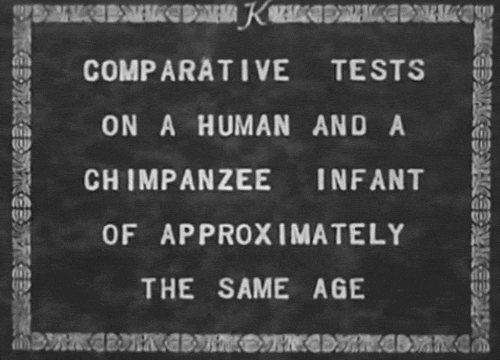The Recent Release Of “Dawn Of The Planet Of The Apes“ Reminded Me Of One Of My Favorite Ape Vs.








The recent release of “Dawn of the Planet of the Apes“ reminded me of one of my favorite ape vs. man films – this 1932 video that shows a baby chimpanzee and a baby human undergoing the same basic psychological tests.
Its gets weirder – the human baby (Donald) and the chimpanzee baby (Gua) were both raised as humans by their biological/adopted father Winthrop Niles Kellogg. Kellogg was a comparative psychologist fascinated by the interplay between nature and nurture, and he devised a fascinating (and questionably ethical) experiment to study it:
Suppose an anthropoid were taken into a typical human family at the day of birth and reared as a child. Suppose he were fed upon a bottle, clothed, washed, bathed, fondled, and given a characteristically human environment; that he were spoken to like the human infant from the moment of parturition; that he had an adopted human mother and an adopted human father.
First, Kellogg had to convince his pregnant wife he wasn’t crazy:
…the enthusiasm of one of us met with so much resistance from the other that it appeared likely we could never come to an agreement upon whether or not we should even attempt such an undertaking.
She apparently gave in, because Donald and Gua were raised, for nine months, as brother and sister. Much like Caesar in the “Planet of the Apes” movies, Gua developed faster than her “brother,” and often outperformed him in tasks. But she soon hit a cognitive wall, and the experiment came to an end. (Probably for the best, as Donald had begun to speak chimpanzee.)
You can read more about Kellogg’s experiment, its legacy, and public reaction to it here.
More Posts from Tonimichelleluttrell and Others
Pure, Simple, beautiful quote!!!
“Two things to remember in life: Take care of your thoughts when you are alone, and take care of your words when you are with people.”
— Zig Ziglar (via purplebuddhaquotes)
You know-- that one!!!!

at Liberty, Kentucky

Read Article Here:
5 Ways to Recognise Depression in Teens
Follow @psych2go for more!

Psychology Daily - Quotes

https://iglovequotes.net/
LOVE THIS!!!
‘Caroline’ rapper Aminé using his national television platform effectively
10 Ways To Beat Procrastination And Get Things Done










Best Life Lessons To Prepare You For 2019

Scientists discover schizophrenia gene roles in brain development
A USC research team identified 150 proteins affecting cell activity and brain development that contribute to mental disorders, including schizophrenia, bipolar condition and depression.
It’s the first time these molecules, which are associated with the disrupted-in-schizophrenia 1 (DISC1) protein linked to mental disorders, have been identified. The scientists developed new tools involving stem cells to determine chemical reactions the proteins use to influence cell functions and nerve growth in people.
“This moves science closer to opportunities for treatment for serious mental illness,” said Marcelo P. Coba, the study author and professor of psychiatry at the Zilkha Neurogenetic Institute at the Keck School of Medicine of USC.
The findings appear in Biological Psychiatry.
Schizophrenia affects less than 1 percent of the U.S. population, but has an outsized impact on disability, suicide and premature deaths.
The DISC1 gene was linked to schizophrenia nearly 20 years ago. It controls how nerve cells called neurons develop, as well as how the brain matures. DISC1 also directs a network of signals across cells that can contribute to the disease. Scientists say errors in these chemical reactions contribute to schizophrenia.
But the identity of proteins that DISC1 can regulate is poorly understood, prompting the USC researchers and colleagues from the State University of New York Downstate Medical Center to undertake the research. The challenge was to simulate conditions inside the human brain, Coba explained.
Using stem cells, they conducted assays resembling habitat where DISC1 does its work. They then used gene editing to insert a molecular tag on DISC1, allowing them to extract it from brain cells and identify the proteins with which it associates.
Identifying the proteins that interact with DISC1 in brain cells could lead to understanding how the risk factors for psychiatric diseases are connected to specific molecular functions, Coba explained. The discovery enables researchers to determine specific processes that differ in patients suffering from specific mental illnesses.
“This gives researchers specific trails to follow within cells from both healthy patients and those diagnosed with disorders,” Coba said.
Schizophrenia research
Schizophrenia is one of the top 15 leading causes of disability worldwide. People with schizophrenia live an average of nearly 29 years less than those without the disorder, according to the National Institutes of Mental Health (NIMH).
The illness is often accompanied by conditions such as heart disease and diabetes, which contribute to the high premature mortality rate among people with schizophrenia. About 5 percent of people with schizophrenia die by suicide, a rate far greater than the general population, with the highest risk in the early stages of illness, according to the NIMH.
-
 gamelpar liked this · 8 months ago
gamelpar liked this · 8 months ago -
 enchantingzinehairdoweasel liked this · 9 months ago
enchantingzinehairdoweasel liked this · 9 months ago -
 usual-suspect reblogged this · 2 years ago
usual-suspect reblogged this · 2 years ago -
 czinober reblogged this · 3 years ago
czinober reblogged this · 3 years ago -
 bunnnyface liked this · 3 years ago
bunnnyface liked this · 3 years ago -
 braeanna liked this · 4 years ago
braeanna liked this · 4 years ago -
 hooman-tree liked this · 4 years ago
hooman-tree liked this · 4 years ago -
 serpensastrum liked this · 4 years ago
serpensastrum liked this · 4 years ago -
 timewaz reblogged this · 4 years ago
timewaz reblogged this · 4 years ago -
 beggerprince72 liked this · 4 years ago
beggerprince72 liked this · 4 years ago -
 lanktangles liked this · 4 years ago
lanktangles liked this · 4 years ago -
 frambuesa-666 liked this · 4 years ago
frambuesa-666 liked this · 4 years ago -
 virtualtravelerr reblogged this · 4 years ago
virtualtravelerr reblogged this · 4 years ago -
 virtualtravelerr liked this · 4 years ago
virtualtravelerr liked this · 4 years ago -
 decemsetem reblogged this · 5 years ago
decemsetem reblogged this · 5 years ago -
 starlight1012 liked this · 6 years ago
starlight1012 liked this · 6 years ago -
 hulk-janitor reblogged this · 6 years ago
hulk-janitor reblogged this · 6 years ago -
 tonimichelleluttrell reblogged this · 6 years ago
tonimichelleluttrell reblogged this · 6 years ago -
 tonimichelleluttrell liked this · 6 years ago
tonimichelleluttrell liked this · 6 years ago -
 cannibalgh0st liked this · 6 years ago
cannibalgh0st liked this · 6 years ago -
 airanitoa reblogged this · 6 years ago
airanitoa reblogged this · 6 years ago -
 bluemakespurplethemultifandomguy liked this · 6 years ago
bluemakespurplethemultifandomguy liked this · 6 years ago -
 kala-maan reblogged this · 6 years ago
kala-maan reblogged this · 6 years ago -
 victimsofdreams reblogged this · 6 years ago
victimsofdreams reblogged this · 6 years ago -
 happycomputerlover liked this · 6 years ago
happycomputerlover liked this · 6 years ago -
 tamiry-the-bonobo liked this · 6 years ago
tamiry-the-bonobo liked this · 6 years ago -
 tiredofhelies liked this · 6 years ago
tiredofhelies liked this · 6 years ago -
 dippiehippie reblogged this · 6 years ago
dippiehippie reblogged this · 6 years ago -
 292-ludovica liked this · 6 years ago
292-ludovica liked this · 6 years ago -
 nicolaus99 liked this · 6 years ago
nicolaus99 liked this · 6 years ago -
 manyfavorites liked this · 6 years ago
manyfavorites liked this · 6 years ago
